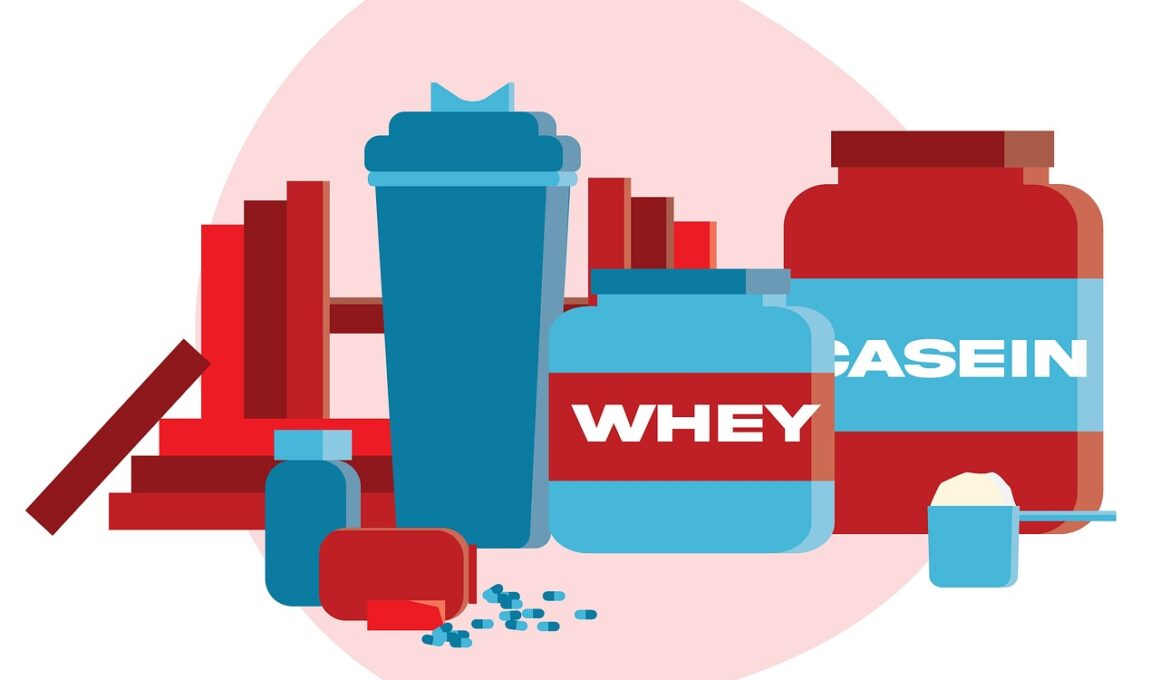The Role of Protein in Weightlifting Nutrition
In the realm of weightlifting, nutrition plays a pivotal role in an athlete’s performance and recovery. Among various nutrients, protein stands out as a crucial element for weightlifters. Protein serves as the building block for muscles and aids in muscle repair and growth, making it indispensable for anyone serious about lifting. Consuming adequate amounts of protein helps minimize muscle breakdown, particularly during intense weight-lifting sessions. The timing of protein intake is also important; athletes should aim for protein consumption both before and after workouts to optimize muscle recovery. Furthermore, varying protein sources, including lean meats, dairy, legumes, and plant-based options, can provide a comprehensive amino acid profile essential for muscle function. In addition, incorporating protein into meals can enhance satiety, helping weightlifters maintain a healthy weight. The recommended daily protein intake for strength athletes ranges from 1.2 to 2.0 grams of protein per kilogram of body weight. It’s essential for weightlifters to monitor their protein consumption closely, ensuring they meet these targets for optimal performance. By doing so, they can support their fitness goals and enhance the effectiveness of their training regimens.
In addition to supporting muscle growth, protein intake has several other benefits that are especially relevant for weightlifters. For example, protein is crucial in the production of enzymes and hormones, which regulate numerous physiological processes in the body. This aspect is particularly important for weightlifters as they often experience hormonal fluctuations due to the intense physical demands placed upon their bodies. Furthermore, research has shown that higher protein intakes can lead to improved body composition, characterized by a greater lean muscle mass. Weightlifters who consume sufficient protein can also experience faster recovery times, allowing them to train more frequently and intensely. It is valuable to explore a variety of protein sources, including whey, casein, chicken, fish, nuts, and beans, to ensure that the body receives a wide range of essential amino acids. Eating protein-rich snacks throughout the day can also support muscle synthesis, especially in combination with carbohydrates. For athletes in high-intensity training, maintaining a balanced macronutrient profile that prioritizes protein can be the difference between plateauing and achieving significant gains in strength and performance.
Protein Timing and Distribution
Another vital consideration for weightlifters is the timing and distribution of protein intake throughout the day. Consistency is key; spreading protein consumption across meals increases the body’s ability to utilize it effectively. Studies suggest that consuming 20 to 30 grams of high-quality protein per meal can optimize muscle protein synthesis. To maximize the benefits of protein, weightlifters should aim to include a protein source in every meal and snack. Additionally, the post-workout window is often referred to as the “anabolic window,” where the body is particularly receptive to nutrients that aid recovery. Consuming protein shortly after workouts can significantly enhance muscle recovery and growth. Along with protein, it is beneficial to pair carbohydrates to replenish glycogen stores depleted during exercise. This synergistic effect helps facilitate muscle recovery and prepares the body for future workouts. Ideal post-workout meals might include a protein shake alongside a banana or a chicken salad with quinoa. Properly timed protein consumption can lead to great improvements in performance, making it a crucial element of an effective weightlifting nutrition plan.
Practical strategies for increasing protein intake can significantly aid weightlifters in meeting their nutritional needs. Meal prepping can help ensure that protein-rich meals are readily available, reducing the temptation to reach for less healthy options post-workout. High-protein snacks, such as Greek yogurt, protein bars, or cottage cheese, are excellent options to keep on hand. Furthermore, incorporating protein powders within smoothies can boost overall protein content and deliver essential nutrients in a convenient manner. For those following a vegetarian or vegan lifestyle, exploring plant-based protein sources like tofu, lentils, and chickpeas can also be effective. Moreover, staying hydrated is equally important because it complements protein synthesis. Keeping track of daily protein intake using nutrition apps can help athletes stay accountable and consistent with their dietary choices. Setting specific protein goals not only promotes discipline but also enhances overall dietary awareness. In this way, weightlifters can ensure they put themselves on a solid footing to achieve their training objectives while fueling their performance effectively through proper nutrition.
Common Misconceptions About Protein Intake
There are numerous misconceptions surrounding protein intake that weightlifters should be aware of. One common myth is that higher protein consumption inevitably leads to increased muscle mass. While protein is vital for muscle development, factors such as overall diet, workout intensity, and genetics play significant roles in determining strength and size. Another misconception is that all protein sources are equally beneficial. However, the quality of protein varies considerably among sources; animal proteins generally provide a more complete amino acid profile than many plant-based options. This doesn’t mean that vegetarians and vegans cannot get sufficient protein. Instead, they must focus on diversifying their protein sources and combining different foods to create a complete profile. Additionally, concerns about the dangers of high protein intake for kidney health are largely unfounded for healthy individuals. Most evidence suggests that a high-protein diet is safe for those without pre-existing kidney conditions. Understanding these misconceptions can empower weightlifters to make more informed dietary choices in their pursuit of strength and performance improvements.
In conclusion, understanding the role of protein in weightlifting nutrition is critical for optimal performance and recovery. By acknowledging the significance of protein quality, timing, and overall intake, weightlifters can align their dietary practices with their fitness goals. The nutritional needs of weightlifters extend beyond just calorie consumption, emphasizing the role of macronutrients in reaching peak performance. Staying educated about protein sources, focusing on both plant and animal options, ensures that athletes receive a comprehensive amino acid profile. Moreover, maintaining a balanced approach to nutrition—where protein intake is integrated with healthy fats and carbohydrates—will support overall health and fuel energy levels during workouts. Engaging with a certified nutritionist can also help tailor more precise nutrition plans based on individual goals. The ongoing evolution of nutritional science provides a wealth of resources for weightlifters seeking to optimize their performance. Finally, consistent evaluation and adaptation of one’s dietary strategies will pave the way for continuous improvement and success within the world of weightlifting.
Final Thoughts on Protein for Weightlifting
Ultimately, the journey of a weightlifter is one that requires commitment not only in training but also in nutrition. Protein’s role in this equation cannot be overlooked; it is fundamental to effective performance, recovery, and continuous strength gains. For weightlifting enthusiasts striving to reach their potential, making informed decisions about protein intake can set the stage for overall success. Adequate hydration should also accompany protein consumption, ensuring that the body functions at its best. Lowering body fat while increasing muscle mass is a complex endeavor, and protein plays a crucial role in this balance. As athletes progress in their training, understanding the evolving needs of their bodies and adjusting protein intake accordingly can greatly enhance their results. Furthermore, the synergy of combining protein with other nutrients for optimal human performance embodies the essence of serious training. In summary, prioritizing protein in a weightlifting diet is not just beneficial; it is essential. Adopting a strategic approach to nutrition can empower athletes, driving them closer to their goals and enriching their weightlifting journeys.
Understanding how to harness the power of protein can greatly benefit athletes, especially those involved in rigorous strength training. This comprehensive approach to weightlifting nutrition not only focuses on macronutrient ratios but also emphasizes the crucial nature of keeping the body fueled and functional. Protein should thus not be an afterthought; rather, it should be a considered component of a balanced diet. Weightlifters are advised to assess their unique needs, taking into account factors such as age, training frequency, and muscle-building goals. Implementing an effective nutritional strategy based on these variables will ensure athletes perform optimally and recover effectively. Regular monitoring of physical progress, dietary habits, and adjustments to macros is essential for attaining desired results. Ultimately, prioritizing protein can make a tangible difference that translates into performance gains, body composition improvements, and injury prevention. With a dedicated focus on appropriate protein intake, consistent training, and an understanding of body mechanics, weightlifters set themselves up for success. Hence, integrating comprehensive nutrition into any weightlifting program can lead to a more effective and rewarding fitness journey.





